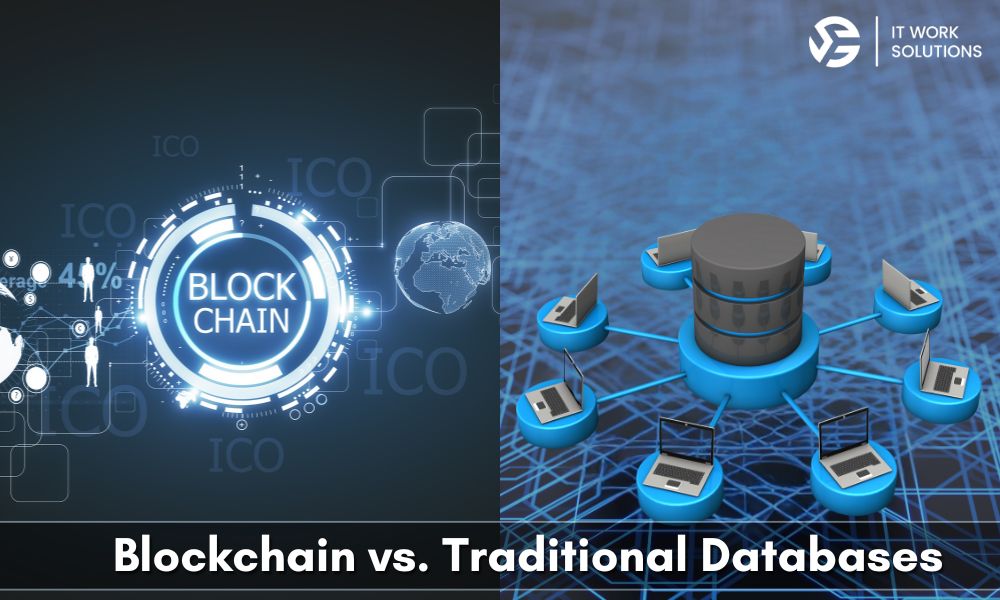Data management is a critical aspect of modern business operations, and choosing the right technology can significantly impact efficiency, security, and scalability. Two major technologies dominate this space: Blockchain and Traditional Databases. While traditional databases have been the backbone of enterprise data management for decades, blockchain technology has emerged as a decentralized and secure alternative.
This article explores the key differences between Blockchain vs Traditional Databases, their advantages, and their impact on businesses. Companies like IT Work Solutions provide innovative Software Development Services to help businesses leverage these technologies effectively.
Understanding Traditional Databases
What Are Traditional Databases?
Traditional databases, such as Relational Databases (RDBMS) and NoSQL Databases, store structured and unstructured data in centralized systems. They use a client-server architecture where a central authority manages data storage, access, and security.
Key Features of Traditional Databases
- Centralized Control – Data is stored and managed by a central authority.
- Structured Query Language (SQL) – Relational databases use SQL for data retrieval and management.
- High Performance – Optimized for fast data transactions and queries.
- Data Modifiability – Users with access permissions can edit, delete, and update records.
- Security Mechanisms – Firewalls, authentication, and encryption are used to protect data.
Common Use Cases
- Banking and finance systems
- E-commerce platforms
- Customer relationship management (CRM) systems
- Enterprise resource planning (ERP) software
Understanding Blockchain
What Is Blockchain?
Blockchain is a decentralized, distributed ledger technology that records transactions securely across multiple nodes. Unlike traditional databases, blockchain does not rely on a central authority but ensures immutability and transparency through cryptographic hashing and consensus mechanisms.
Key Features of Blockchain
- Decentralization – No single entity controls the entire database.
- Immutable Records – Once data is added, it cannot be altered or deleted.
- Transparency & Security – Transactions are visible and verifiable by all participants.
- Consensus Mechanism – Transactions require network agreement for validation.
- Smart Contracts – Automated, self-executing contracts with predefined conditions.
Common Use Cases
- Cryptocurrencies (e.g., Bitcoin, Ethereum)
- Supply chain management
- Healthcare data security
- Digital identity verification
Blockchain vs Traditional Databases: Key Differences
| Feature | Blockchain | Traditional Databases |
| Data Structure | Distributed ledger (blocks linked via cryptography) | Centralized, table-based schema |
| Control | Decentralized (peer-to-peer) | Centralized (admin-controlled) |
| Security | High (encryption, consensus mechanisms) | Relies on firewalls, authentication |
| Scalability | Slower due to consensus mechanisms | Highly scalable for large-scale applications |
| Immutability | Records are permanent and tamper-proof | Data can be edited or deleted |
| Cost | Higher due to computing power and storage requirements | Cost-effective for traditional enterprise use |
| Speed | Slower due to verification processes | Faster transactions and queries |
| Transparency | Fully transparent and verifiable | Controlled visibility with permissions |
Which Technology Should Businesses Choose?
The choice between Blockchain vs Traditional Databases depends on business needs and use cases. Here’s a breakdown:
When to Use Traditional Databases
- When high-speed transactions are required.
- When a business needs centralized control over data.
- When cost-effectiveness is a priority.
- When regulatory compliance demands centralized data storage.
When to Use Blockchain
- When security and transparency are critical (e.g., financial transactions, supply chains).
- When businesses need immutable records for legal or audit purposes.
- When decentralization is necessary to remove intermediaries.
- When smart contracts can automate business operations.
Role of IT Work Solutions in Blockchain and Database Development
IT Work Solutions offers cutting-edge Software Development Services that help businesses integrate blockchain and traditional databases effectively. Our expertise includes:
- Developing custom blockchain solutions for secure transactions.
- Implementing traditional database management systems for enterprise applications.
- Providing Digital Marketing Services to enhance brand visibility.
- Offering Managed IT Services for optimized business operations.
With a team of experts, IT Work Solutions ensures businesses adopt the right technology for their data management needs.
Future of Blockchain and Traditional Databases
The evolution of blockchain and traditional databases will shape future business operations. Hybrid solutions, which combine both technologies, are emerging as an efficient approach to optimize speed, security, and scalability. As blockchain technology advances, businesses will explore new applications in finance, healthcare, supply chains, and identity management.
More Insights:
Blockchain Technology: Future Trends and Applications
Latest IT Trends and Innovations Shaping 2025
How Internet of things is Revolutionizing Business in 2025
FAQs
1. Is blockchain more secure than traditional databases?
Yes, blockchain uses cryptographic hashing and decentralization, making it more secure against tampering and fraud compared to traditional databases.
2. Can blockchain replace traditional databases?
Not entirely. While blockchain is excellent for security and transparency, traditional databases are still more efficient for high-speed transactions and data modifications.
3. What are the main challenges of adopting blockchain?
Challenges include high computational costs, slower processing speeds, and regulatory uncertainties. Businesses must evaluate whether blockchain is the right fit for their needs.
4. How can businesses integrate blockchain into their operations?
Companies like IT Work Solutions offer Software Development Services to help businesses implement blockchain for security, transparency, and automation.
5. Which industries benefit the most from blockchain?
Industries such as finance, healthcare, supply chain, and digital identity verification benefit significantly from blockchain adoption.
Conclusion
The debate between Blockchain vs Traditional Databases highlights the strengths and limitations of both technologies. Businesses must assess their priorities—whether they need speed, security, transparency, or scalability—to choose the best solution.
By partnering with IT Work Solutions, businesses can leverage Software Development Services to integrate blockchain and traditional databases efficiently. As technology evolves, businesses that adopt innovative data management solutions will achieve a competitive edge in their industry.








